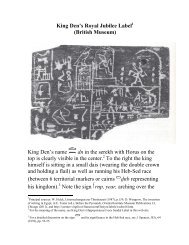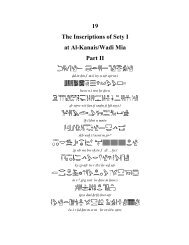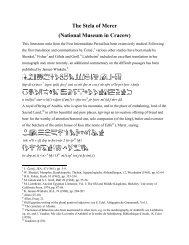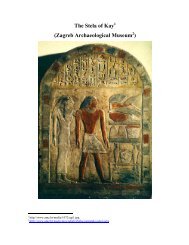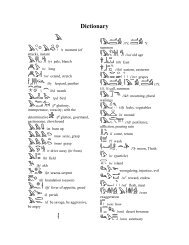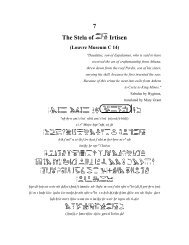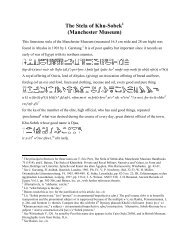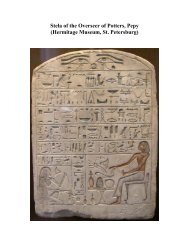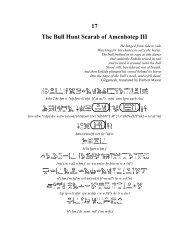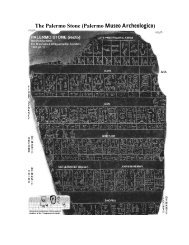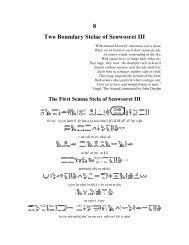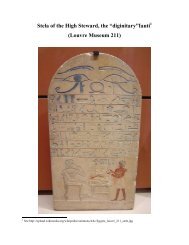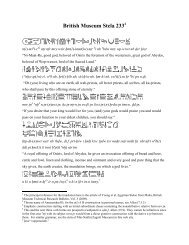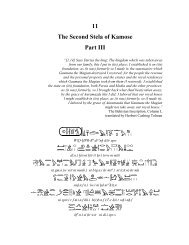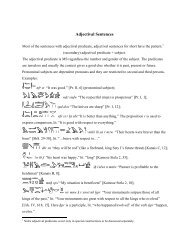The Autobiography of Admiral Ahmose - Middle Egyptian Grammar ...
The Autobiography of Admiral Ahmose - Middle Egyptian Grammar ...
The Autobiography of Admiral Ahmose - Middle Egyptian Grammar ...
You also want an ePaper? Increase the reach of your titles
YUMPU automatically turns print PDFs into web optimized ePapers that Google loves.
12<br />
<strong>The</strong> <strong>Autobiography</strong> <strong>of</strong> <strong>Admiral</strong> <strong>Ahmose</strong><br />
“And these were the great rewards that were promised<br />
to him if he consented to make that combat and fight:<br />
a chariot <strong>of</strong> the value <strong>of</strong> four times seven cumals, 1<br />
and the equipment <strong>of</strong> twelve men with garments <strong>of</strong> all<br />
colours, and the length and breadth <strong>of</strong> his own territory<br />
on the choice part <strong>of</strong> the plains <strong>of</strong> Maw Ay; free <strong>of</strong> tribute,<br />
without purchase, free from the incidents <strong>of</strong> attendance<br />
at courts and <strong>of</strong> military service, that therein his son, and<br />
his grandson, and all his descendants might dwell in safety<br />
to the end <strong>of</strong> life and time; also Finnabar the daughter <strong>of</strong><br />
Maas his wedded wife, and the golden brooch which<br />
was in the cloak <strong>of</strong> Queen Maev in addition to all this.”<br />
Táin Bó Cúailnge (<strong>The</strong> Cattle Raid <strong>of</strong> Cooley)<br />
from the Ulster Cycle as Translated by A. H. Leahy<br />
Part I<br />
Introduction<br />
Hri Xnyt iaH-ms zA ibAnA mAa xrw Dd.f<br />
Dd.i n.tn rmT(t) nbt di.i rx.tn Hzwt xprt n.i<br />
iwa.kw m nbw zp 7 xft Hr tA r Dr.f<br />
1<br />
<strong>The</strong> cumal is the measure for the basic unit <strong>of</strong> land in Ireland comprising about or 13.85 hectares,<br />
sufficient to graze three cows there.
Hmw Hmwt r mitt irw<br />
sAH.kw m AHwt aSA wrt<br />
iw rn n qn m irt.n.f nn Htm m tA pn Dt<br />
Youth<br />
Dd.f r ntt ir.n.i xprw.i m dmi n nxb<br />
iw it(i).i m waw n nswt-biti %QN.N-Ra maA xrw<br />
bAbA zA rint rn.f<br />
aHa.n.i Hr irt waw r DbA.f m pA dpt n pA-smA<br />
m hAw nb tAwi NB-P@&I-Ra mAa xrw<br />
iw.i m Sri ni irt.i Hmt<br />
iw sDr.i m smt Snw<br />
Expulsion <strong>of</strong> the Hyksos<br />
xr m xt grg.n.i pr<br />
aHa.n.i it.kw r pA dpt mHti Hr qnn.i
wn.xr.i Hr Sms ity anx(.w)-(w)DA(.w)-s(nb.w) Hr rdwi.i<br />
m xt swtwt.f Hr wr(r)t.f<br />
iw Hms.tw Hr dmi n Hwt-wart<br />
wn.xr.i Hr qnt Hr rdwi.i m bAH Hm.f<br />
aHa.n.i dhn.kw r xa-m-mn-nfr<br />
wn.in.tw Hr aHA Hr mw m pA-Ddkw n Hwt-wart<br />
aHa.n xfa.n.i in.i Drt 1<br />
smi.T(w) n wHmw nswt wn.in.tw Hr rdit n.i nbw n qnt<br />
aHa.n wHmw aHA m st tn wn.in.i Hr wHm xfa im<br />
in.i Drt 1<br />
wn.in.tw Hr rdit n.i nbw n qnt m wHm a<br />
wn.in.tw Hr aHA m tA kmt rswt n dmi pn<br />
aHa.n in.n.i sqr-anH z(i) 1<br />
hA.n.i r pA mw
m.k in.tw.f m mH Hr tA Hrt pA dmi<br />
DA.n.i Xr.f Hr mw<br />
smiw n wHmw nswt aHa.n.tw Hr iwa.i m nbw Hr snnw.si<br />
wn.in.tw Hr HAq Hwt-wart<br />
wn.in.i Hr int HAqt im<br />
z(i) 1 zt Hmt 3 dmd r tp 4<br />
wn.in Hm.f Hr rdit st n.i r Hmw<br />
wn.in.tw Hr Hsmt Hr SArHAnA m rnpwt 3<br />
wn.in Hm.f Hr HAq s(i)<br />
aHa.n in.n.i HAqt im zt Hmt 2 Drt 1<br />
wn.in.tw Hr rdit n.i nbw n qnt<br />
m.k rdit n.i HAqt.i r Hmw
<strong>The</strong> <strong>Autobiography</strong> <strong>of</strong> <strong>Admiral</strong> <strong>Ahmose</strong>: Part I<br />
Hri (up)on<br />
Xni row, transport (by boat)<br />
Xnyt crew<br />
iaH moon, Thoth<br />
mAa xrw justified<br />
rmTt men, mankind<br />
nbw gold<br />
Hzt favor<br />
iwa reward, endow<br />
Hmw (male) servant<br />
Hmt (female) servant<br />
AHt field<br />
aSA many<br />
wrt very<br />
rn name, identity<br />
sAH endow (m with)<br />
qni (adjective-verb) brave,<br />
diligent, persevering<br />
growth<br />
quay<br />
tA land<br />
Htm perish<br />
Dt forever, eternity<br />
xprw form, shape, stages <strong>of</strong><br />
dmi town, quarter, abode,<br />
Vocabulary<br />
nxb Nekheb (El Kab)<br />
waw soldier<br />
zA son<br />
, pHti strength<br />
(r in exchange for)<br />
area, affairs<br />
dpt ship, boat<br />
smA wild bull<br />
Sri little<br />
Hmt woman, wife<br />
iti father<br />
DbA, dbA replace<br />
hAw time, vicinity,<br />
sDr lie down, spend the<br />
night, sleep<br />
xt wake, aftermath; m xt<br />
after, future<br />
grg set up, establish<br />
, iTi/iti take (possession <strong>of</strong>)<br />
mHti northern<br />
Smsi follow<br />
ity, itii sovereign<br />
anx(.w)-(w)DA(.w)-s(nb.w) lph<br />
rd foot<br />
travel, journey<br />
swtwt walk about,
wrrt chariot<br />
Hmsi sit, sit down, besiege<br />
Hwt-wart Avaris (Hyksos<br />
capital in the Delta)<br />
bAH presence<br />
Hm incarnation, majesty<br />
dhn bow, appoint<br />
xai appear, rise<br />
mn-nfr Memphis<br />
aHA fight<br />
Pjedku (canal at Avaris)<br />
seize<br />
valor<br />
pA-Ddkw<br />
xfa grasp, make capture,<br />
drt hand<br />
smi report<br />
wHm repeat<br />
st place, throne<br />
rsi south, southern<br />
nbw n qnt gold <strong>of</strong><br />
prisoner <strong>of</strong> war<br />
z(i) man<br />
sqr-anx<br />
hAi go down, head (r for)<br />
mw water<br />
mH hold<br />
Xr under<br />
snnw second<br />
Hrw r apart from, besides<br />
DAi cross (water), ferry<br />
HAq plunder<br />
HAqt plunder<br />
zt Hmt woman<br />
dmDi/dmdi unite, total, sum<br />
dmD/dmd (r) total<br />
tp head, top<br />
SArHAnA Sharuhen<br />
(town in the Negev Desert)<br />
rnpt year
<strong>The</strong> <strong>Autobiography</strong> <strong>of</strong> <strong>Admiral</strong> <strong>Ahmose</strong>: Part I<br />
<strong>Grammar</strong> Points<br />
Introduction<br />
Hri Xnyt iaH-ms zA ibAnA mAa xrw Dd.f<br />
<strong>The</strong> nisbe Hri “upper, lying on” is derived form <strong>of</strong> the preposition Hr “(up)on.” It is an<br />
adjective used here as a noun “chief, commander, master,” lit. “one who is above.” <strong>The</strong><br />
double-stroke sign is not shown but the sky/above determinative clearly points to the<br />
meaning. <strong>The</strong>re is a graphic transposition in Xnyt “crew”, a collective noun<br />
derived from the verb Xni “row.” <strong>The</strong> title “crew commander” can be upgraded<br />
to “naval commander.” or iaH originally meant the moon god but<br />
eventually became Thoth, the god <strong>of</strong> writing and knowledge. It is an ibis (less frequently<br />
a baboon) headed anthropomorphic deity (sometimes holding the anx sign: ). In the<br />
following speech the creator makes Thoth to embrace the two skies (the world and the<br />
Duat below) and with this act makes the “moon <strong>of</strong> Thoth” evolve:<br />
iw.i gr r rdit inH.k pti m nfrw.k m HDwt.k xpr iaH pw n DHwti 1 . (Here in the last A pw noun<br />
clause the nonattributive perfective relative form <strong>of</strong> xpr “evolve” is used as the predicate;<br />
note that pw moved forward in side the indirect genitive iaH n DHwti “the moon <strong>of</strong> Thoth.”)<br />
<strong>The</strong> name iaH-ms “moon/Thoth is born” contains the passive form <strong>of</strong> msj “give birth.”<br />
ibAnA has been translated as Ibana, Eben, Abana, Abena, and Abina. <strong>The</strong> adjective<br />
phrase mAa xrw usually translates as “justified,” lit. “true <strong>of</strong> voice.” It<br />
signifies that the person in question lived a just life, passed the weighing the heart<br />
1<br />
See E. Hornung, Der ägyptische Mythos von der Himmelskuh: eine Ätiologie des Unvollkommenen,<br />
Academic Press Fribourg, 1991.
ceremony, made a successful transition to afterlife, and joined the society <strong>of</strong> the dead.<br />
<strong>The</strong> long topicalized subject is followed by the narrative infinitive <strong>of</strong> Dd.<br />
Dd.i n.tn rmT(t) nbt di.i rx.tn Hzwt xprt n.i<br />
<strong>The</strong> two clauses here have verbal predicates <strong>of</strong> the verbs Dd and rdi both in intentional<br />
prospective/subjunctive sDm.f forms: “I will tell” and “I will let.” <strong>The</strong> feminine form <strong>of</strong><br />
nb reveals that, instead <strong>of</strong> rmT “people”, its collective form rmTt “men, mankind”<br />
is used here. In the second clause the rdi sDm.f construction “let him hear,” lit.<br />
“cause/give that he hear” is used with rdi and, by construction, rx in prospective<br />
/subjunctive sDm.f. Note the archaizing writing <strong>of</strong> the plural <strong>of</strong> the (feminine) noun<br />
Hzt. Matching this, the perfective active participle <strong>of</strong> the verb xpr is in<br />
feminine plural form “which came” lit.“which happened.”<br />
iwa.kw m nbw zp 7 xft Hr tA r Dr.f<br />
Hmw Hmwt r mitt irw<br />
In stative the transitive verb iwa “reward” has passive meaning. <strong>The</strong> compound<br />
preposition xft Hr can be translated as “in the presence/sight <strong>of</strong>,” lit.“before the face <strong>of</strong>.”<br />
<strong>The</strong> prepositional phrase r Dr lit. “to the limit” is best translated as an (apparent) adjective<br />
“whole, entire.” <strong>The</strong> next two nouns (in apposition) “the male and female servants” are<br />
still governed by the preposition m. <strong>The</strong> plural <strong>of</strong> the closing phrase r mitt iri “as well” lit.<br />
“the like/similar pertaining to it” is composed <strong>of</strong> two nisbes from the prepositions mi and<br />
r. We met this in the Story <strong>of</strong> the Shipwrecked Sailor: mitt iri xpr 2<br />
sAH.kw m AHwt aSA wrt<br />
<strong>The</strong> sentence here matches with the previous with identical grammar. Namely, the stative<br />
<strong>of</strong> the transitive verb sAH “endow” has passive meaning, and is used to recount that “great<br />
2 [Sh. S. 21].
many fields” came into <strong>Ahmose</strong>’s possession. Note that the plural strokes in aSA<br />
“many” is always a determinative.<br />
iw rn n qn m irt.n.f nn Htm m tA pn Dt<br />
<strong>The</strong> first main clause is an adverbial sentence <strong>of</strong> identity introduced by the particle iw.<br />
<strong>The</strong> subject is the noun phrase rn n qn “the name <strong>of</strong> the brave,” with qn “brave (one)”<br />
also a military title 3 . <strong>The</strong> “m <strong>of</strong> predication” is given by the perfect relative form <strong>of</strong> iri<br />
“that which (he) has done.” According to Goedicke, the alternate reading irt n.f is also<br />
possible with irt being the perfective passive participle <strong>of</strong> iri: “what is done.”<br />
Note that in <strong>Middle</strong> <strong>Egyptian</strong>, m <strong>of</strong> predication is used for temporary or acquired identity<br />
or pr<strong>of</strong>ession. In contrast, for unchangeable or natural identity nominal sentences are used.<br />
In English and, say, in Russian this distinction does not exist. Fore example, oн отец “he<br />
is a father” (unchangeable identity) and oн учитель “he is a teacher” (acquired pr<strong>of</strong>ession)<br />
use the same construction. In Chinese, however, the same sentences are 他是爸爸 (tā shì<br />
bàba) and 他当老师 (tā dàng lăoshī), and the distinction is made by the use <strong>of</strong> different<br />
verbs: 是 (shì) “is” and 当(dàng) “act as.” It is interesting to note that in Chinese one can<br />
also say 他是老师 (tā shì lăoshī) to indicate that the teacher is well-established, and 他当<br />
爸爸 (tā dàng bàba) means that he is not really a father only tries to be either pretending<br />
or having been asked to be one (temporarily).<br />
<strong>The</strong> second sentence is a typical nn + prospective/subjunctive sDm.f construction and as<br />
such it has future meaning. <strong>The</strong> subject rn n qn is omitted since it is the same as in the<br />
previous sentence. This sentence is a proverb used also in the Thutmose III Inscriptions 4 .<br />
Dd.f r ntt ir.n.i xprw.i m dmi n nxb<br />
3 [Urk. IV, 34, 2].<br />
4 [Urk. IV, 684, 17; 780, 14-15].<br />
Youth
This is a break in the narrative since after the introduction <strong>Ahmose</strong> now begins to talk<br />
about his youth and upbringing. It starts with the narrative infinitive <strong>of</strong> Dd. It is followed<br />
by the prepositional phrase r ntt which introduces subsequent statements and can be<br />
translated using “as follows,” lit. “with respect to (the fact) that.” As we saw in the Story<br />
<strong>of</strong> the Shipwrecked Sailor already twice:<br />
ir.n.i hrw 3 wa.kw 5 and m.k tw r irt Abd Hr<br />
Abd 6 , the verb iri (in circumstantial sDm.n.f /perfect here) not only means “make, do” but<br />
also “pass/spend time.” xprw means “form, shape, stages <strong>of</strong> growth.” With<br />
these, the <strong>Egyptian</strong> phrase ir.f xprw.f m can be rendered as “he spends his youth in” or<br />
“he has his upbringing in,” lit. “he passes his stages <strong>of</strong> growth in.” nxb is the<br />
ancient Nekheb, near the present day El Kab, south <strong>of</strong> Luxor.<br />
iw it(i).i m waw n nswt-biti %QN.N-Ra maA xrw<br />
This is another adverbial sentence <strong>of</strong> identity, an m <strong>of</strong> predication. %QN.N-Ra “Whom Re<br />
has made brave” is Sekenenre Taa II, a local <strong>The</strong>ban ruler and the next-to-last king <strong>of</strong> the<br />
17 th Dynasty, Second Intermediate Period, c.1560 BC. <strong>The</strong> verb form in the name is a<br />
perfect relative form (<strong>of</strong> the causative) <strong>of</strong> the verb qni “brave.”<br />
bAbA zA rint rn.f<br />
This is a typical AB nominal sentence used by <strong>Ahmose</strong> to tell his father’s and his<br />
(paternal) grandmother’s names: Baba, son <strong>of</strong> Ra-inet, was his name. Note the use <strong>of</strong> the<br />
<strong>Egyptian</strong> ditto sign zp 2 in the name bAbA.<br />
aHa.n.i Hr irt waw r DbA.f m pA dpt n pA-smA<br />
5 [Sh. S. 41].<br />
6 [Sh. S. 117].
m hAw nb tAwi NB-P@&I-Ra mAa xrw<br />
<strong>The</strong> presudoverbal construction Hr irt, lit. “upon doing” describes the action in progress:<br />
<strong>Ahmose</strong> being a soldier or serving as an <strong>of</strong>ficer. <strong>The</strong> compound preposition r DbA “in<br />
exchange for,” lit. “in order to replace” here with the suffix pronoun f has the meaning<br />
“in his service.” At this stage <strong>of</strong> the language pA is no longer a demonstrative pronoun but<br />
the definite article “the.” pA-smA “Wild Bull” is the name <strong>of</strong> the ship.<br />
<strong>The</strong> typical epithet nb tAwi “Lord <strong>of</strong> the Two Lands” refers here to the pharaoh NB-P@&I-<br />
Ra “<strong>The</strong> lord <strong>of</strong> strength is Re.” This is the prenomen <strong>of</strong> <strong>Ahmose</strong> I (1550-1525 BC), the<br />
founder <strong>of</strong> the 18 th Dynasty, after he assumed the throne. Note that in the king’s name the<br />
double t is not tt but a peculiar way <strong>of</strong> writing ti, the so-called “sportive dual.”<br />
Alternative spellings <strong>of</strong> pHti “strength” are and .<br />
iw.i m Sri ni irt.i Hmt<br />
Another adverbial sentence <strong>of</strong> identity here is followed by an unmarked relative clause<br />
employing the ni sDmt.f construction. We have already met this in the Story <strong>of</strong> the<br />
Shipwrecked Sailor. This construction carries the meaning that the action has not<br />
happened yet which, in this case, means that at this point <strong>Ahmose</strong> has not been married,<br />
lit. “has not made a wife.”<br />
iw sDr.i m smt Snw<br />
<strong>The</strong> particle iw introduces the imperfective <strong>of</strong> the verb sDr referring to habitual action in<br />
the past. In English this can be rendered inserting “used to” in front <strong>of</strong> the verb. <strong>The</strong><br />
meaning <strong>of</strong> the phrase smt Snw is unknown. <strong>The</strong>re is some support to the argument that it<br />
should mean some typical garment <strong>of</strong> youth 7 or a net <strong>of</strong> hammock (Gardiner and Gunn).<br />
7 [Breasted, II, p.6].<br />
Expulsion <strong>of</strong> the Hyksos
xr m xt grg.n.i pr<br />
This is a good example for one <strong>of</strong> the basic functions <strong>of</strong> the particle xr as a converter to<br />
let the prepositional phrase m xt “after,” lit. “in the wake” stand in front <strong>of</strong> the sentence.<br />
Together they can be translated as “then later.” <strong>The</strong> usual meaning <strong>of</strong> the noun pr<br />
“house,” the object <strong>of</strong> the circumstantial sDm.n.f /perfect form <strong>of</strong> the verb grg, should be<br />
“household” here.<br />
aHa.n.i it.kw r pA dpt mHti Hr qnn.i<br />
In the subject-stative construction the transitive verb iti/iTi has passive meaning, “was<br />
transferred.” <strong>The</strong> nisbe mHti “northern” is derived from mHyt “northwind,” and it is the<br />
name <strong>of</strong> the ship. Alternatively, though the plural strokes are missing, may be the<br />
ideogram for aHaw “ship(s)” and together with the demonstrative pronoun pA aHaw may<br />
mean “the fleet” (with mHti being an adjective). <strong>The</strong> preposition Hr “because” governs a<br />
clause <strong>of</strong> causality in which qnn is a nonattributive relative form <strong>of</strong> the adjective-verb qni<br />
“be brave” used emphatically.<br />
wn.xr.i Hr Sms ity anx(.w)-(w)DA(.w)-s(nb.w) Hr rdwi.i<br />
m xt swtwt.f Hr wr(r)t.f<br />
wn.xr “then” introduces the pseudoverbal Hr + infinitive construction indicating action in<br />
progress: “then I followed,” lit. “then I existed upon following.” Note that wn.xr is used<br />
only after the 18 th Dynasty onwards. is another spelling <strong>of</strong> ity, itii<br />
“sovereign” that we met before.<br />
In the adverbial phrase introduced by the compound preposition m xt the verbal noun<br />
swtwt “journey, travel” is derived from the rare 5-lit. verb swtwt “walk (about),<br />
promenade.” Having plural ending, it cannot be infinitive. Nevertheless, a possible<br />
rendering could use a verbal predicate: “when he was riding about,” lit. “in the wake <strong>of</strong><br />
his journeys.” Note that wrrt “chariot” is used in <strong>Egyptian</strong> history the first time during the<br />
Hyksos period.
iw Hms.tw Hr dmi n Hwt-wart<br />
Hmsi “sit down, reside” also means “besiege” and the iw sDm.f /imperfective construction<br />
with the impersonal suffix pronoun tw indicates that the action happened in the past; the<br />
English past imperfect “was besieged” is a good way to render this construction. Note<br />
that dmi not only means “harbor, quay” but also “town.” Hwt-wart is the<br />
name <strong>of</strong> the Delta town Avaris, the Hyksos capital at the time. It has been identified with<br />
the site Tell el-Dab‘a.<br />
wn.xr.i Hr qnt Hr rdwi.i m bAH Hm.f<br />
<strong>The</strong> grammar <strong>of</strong> this sentence is similar to the one above. This time it is applied to the<br />
adjective-verb qni. It means that at the time <strong>of</strong> the siege <strong>of</strong> Avaris <strong>Ahmose</strong> fought bravely,<br />
lit. “existed upon being brave.” Note also the different spelling <strong>of</strong><br />
m bAH “in the presence <strong>of</strong>.”<br />
aHa.n.i dhn.kw r xa-m-mn-nfr<br />
Once again a subject-stative construction involving the transitive verb dhn “appoint” has<br />
passive meaning. xa is a perfective active participle <strong>of</strong> xai “rise” and mn-nfr is Memphis,<br />
lit. “Established and Beautiful.” <strong>The</strong> ship determinative shows that<br />
xa-m-mn-nfr “Rising in Memphis” is the name <strong>of</strong> the ship. <strong>The</strong> first (pyramid)<br />
determinative is for the town <strong>of</strong> Memphis (because <strong>of</strong> its necropolis), usually written<br />
as . Goedicke argued that xam mn-nfr means a secondary coronation<br />
ceremony <strong>of</strong> <strong>Ahmose</strong> in Memphis, thereby the name <strong>of</strong> the ship may commemorate this<br />
event.<br />
wn.in.tw Hr aHA Hr mw m pA-Ddkw n Hwt-wart
For a change, here it is the impersonal suffix pronoun that makes the sentence having<br />
passive meaning. <strong>The</strong> pseudoverbal Hr + infinitive construction means action in progress,<br />
and the literal meaning “one was fighting” can be improved to “there was fighting.” <strong>The</strong><br />
determinative reveals that pA-Ddkw is a canal, less likely a harbor town or a quay.<br />
Excavations at Tell el-Dab‘a point to the fact that the Pelusiac branch <strong>of</strong> the Nile, along<br />
with smaller tributaries were close to the city, and thus pA-Ddkw may be the name <strong>of</strong> one<br />
<strong>of</strong> there waterways.<br />
aHa.n xfa.n.i in.i Drt 1<br />
is a variant <strong>of</strong> xfa “grasp, make capture, seize.” Depending on<br />
whether the phonetic complement (<strong>of</strong> the stem) <strong>of</strong> is present or absent, can<br />
be considered as the indicative/perfective sDm.f: in.i, or the (transitive) circumstantial<br />
sDm.n.f /perfect: in.n.i. <strong>The</strong> indicative/perfective is supported by the fact that elsewhere in<br />
the text (in similar clauses) the scribe did use phonetic complements. <strong>The</strong> circumstantial<br />
sDm.n.f /perfect is supported since it matches the previous. <strong>The</strong> issue is a bit academic,<br />
since in either case, the meaning is past tense. Finally, to show the number <strong>of</strong> enemies a<br />
warrior slew he had to cut <strong>of</strong>f and bring back the right hands <strong>of</strong> the slain. <strong>The</strong> flesh<br />
determinative attests this gruesome practice.<br />
smiT n wHmw nswt wn.in.tw Hr rdit n.i nbw n qnt<br />
<strong>The</strong> verb form <strong>of</strong> the caus. 2-lit. verb smi “report” (with base stem smi) is problematic.<br />
(A few lines below the same sentence appears with the predicate smiw which<br />
is clearly passive.) <strong>The</strong> ending can be considered an archaizing t, therefore smit could<br />
either be an infinitive or, equally likely, a perfective passive participle attached to the<br />
previous passage: “that which was reported.” wHmw nswt (in honorific transposition) is<br />
the royal herald, where wHmw itself is a participle/noun <strong>of</strong> agent derived from wHm<br />
“repeat.” nbw n qnt is the “gold <strong>of</strong> valor”, a military reward for courage and prowess. It is<br />
a golden necklace with fly-shaped pendants.
aHa.n wHmw aHA m st tn wn.in.i Hr wHm xfa im<br />
in.i Drt 1<br />
<strong>The</strong> transitive verb wHm appears first in the passive and then in a pseudoverbal Hr +<br />
infinitive construction. <strong>The</strong> objects are the infinitives <strong>of</strong> aHA and xfa used as nouns. Both<br />
clauses can be translated using the word “again,” lit. “fighting has been repeated” and<br />
“(upon) repeating capturing.” <strong>The</strong> last clause with the indicative/perfective (or<br />
circumstantial sDm.n.f /perfect; see the discussion above) <strong>of</strong> ini concludes the events.<br />
wn.in.tw Hr rdit n.i nbw n qnt m wHm a<br />
This sentence has already appeared and has been discussed previously with the added<br />
remark that the adverb m wHm a is an <strong>Egyptian</strong> phrase for “a second time, again.”<br />
wn.in.tw Hr aHA m tA kmt rswt n dmi pn<br />
At least from the point <strong>of</strong> view <strong>of</strong> grammar, the biography here is repetitive. <strong>The</strong> tongue<br />
<strong>of</strong> land determinative indicates that rswt is a noun, therefore the location kmt rswt n<br />
dmi pn is “Egypt, (which is to) the south <strong>of</strong> this town”, where by town Avaris is meant.<br />
aHa.n in.n.i sqr-anH z(i) 1<br />
This time <strong>Ahmose</strong> ended the fight by carrying <strong>of</strong>f (in circumstantial sDm.n.f /perfect) a<br />
prisoner <strong>of</strong> war. <strong>The</strong> passive participle <strong>of</strong> the verb sqr “smite, strike down” is<br />
used in the noun<br />
smitten alive.”<br />
sqr-anx “prisoner <strong>of</strong> war,” lit. “(one) who is<br />
hA.n.i r pA mw
m.k in.tw.f m mH Hr tA Hrt pA dmi<br />
DA.n.i Xr.f Hr mw<br />
Examining the three clauses we can reconstruct the sequence <strong>of</strong> events as follows.<br />
<strong>Ahmose</strong> went down to the water: hAi r pA mw, lit. “head for the water” (with the<br />
circumstantial sDm.n.f /perfect <strong>of</strong> hAi), captured/carried <strong>of</strong>f a prisoner ini m<br />
mH, lit. “bring/carry as holding” (with the circumstantial/imperfective sDm.f <strong>of</strong> ini<br />
expressing concomitant action and the infinitive <strong>of</strong> mH ”hold”) on the side <strong>of</strong> the<br />
town tA Hrt pA dmi , where the compound preposition Hrw-r (with omitted<br />
r) stands for “besides,” lit. “apart from.” <strong>The</strong>refore the <strong>Egyptian</strong> army was on the other<br />
side <strong>of</strong> the town. <strong>The</strong> exact situation in this feat <strong>of</strong> bravery is further emphasized in the<br />
last clause by stating that he crossed the water DAi Hr mw (with the circumstantial sDm.n.f<br />
/perfect <strong>of</strong> DAi) carrying the prisoner on his back Xr.f, lit. “under him.”<br />
smiw n wHmw nswt aHa.n.tw Hr iwa.i m nbw Hr snnw.si<br />
<strong>The</strong> passive <strong>of</strong> the verb smi without an expressed subject starts the sentence “(it) was<br />
reported.” We now meet a strange peculiarity <strong>of</strong> this inscription, namely that before the<br />
infinitive <strong>of</strong> the verb iwa we would expect the preposition Hr but find the particle<br />
m.k, a scribal error (possibly a hieratic confusion) which needs to be emended<br />
to here. In Hr iwa.i the suffix pronoun is the object <strong>of</strong> the infinitive, lit. “upon<br />
rewarding me.” <strong>The</strong> phrase Hr snnw.si “second time” involves the cardinal number snnw<br />
“second” used as a noun, lit. “upon its second.” Note the extra in the suffix pronoun<br />
copied from the dual.<br />
wn.in.tw Hr HAq Hwt-wart
wn.in.i Hr int HAqt im<br />
<strong>The</strong> fate <strong>of</strong> Avaris is described here (with a simple grammar) by the use <strong>of</strong> the verb HAk<br />
“plunder” and the collective noun HAqt “plunder” derived from it.<br />
z(i) 1 zt Hmt 3 dmd r tp 4 wn.in Hm.f Hr rdit st n.i r Hmw<br />
<strong>Ahmose</strong> recounts here his gains: dmd/dmD (r) stands for “total”, a word derived from the<br />
verb dmdi/dmDi “unite, total, sum.” Note also that the captives were counted by tp<br />
“head” (and the slain, as we saw above, by Drt “hand”).<br />
“And the second lot came forth to Simeon,<br />
Even for the tribe <strong>of</strong> the children <strong>of</strong> Simeon<br />
According to their families: and their inheritance<br />
was within the inheritance <strong>of</strong> the children <strong>of</strong> Judah.<br />
… And Beth-leb’a-oth, and Sha-ru’hen;<br />
Thirteen cities and their villages:”<br />
Joshua 19:1, 6<br />
<strong>The</strong> Bible (King James Version)<br />
wn.in.tw Hr Hsmt Hr SArHAnA m rnpwt 3<br />
<strong>The</strong> earlier iw sDm.f /imperfective iw Hms.tw is changed here to wn.in.tw Hr Hmt, a<br />
pseudoverbal construction after wn.in, with the only difference in meaning is that wn.in<br />
(and aHa.n) emphasize subsequent action. According to the Book <strong>of</strong> Joshua, Sharuhen is<br />
in southern Canaan, Simeon’s tribal territory. Although many arguments have been put<br />
forward, there is not enough archaeological evidence to pinpoint its exact location. <strong>The</strong>re<br />
is also a debate about the exact number <strong>of</strong> years <strong>of</strong> the siege <strong>of</strong> Sharuhen; the readings<br />
vary between 3, 5 or 6. In any case, the stubborn resistance <strong>of</strong> the retreating Hyksos is<br />
apparent.<br />
wn.in Hm.f Hr HAq s(i)
A sentence similar to this appeared above; the subject <strong>of</strong> the infinitive HAq is expressed<br />
(Hm.f ) therefore its pronominal object has the dependent form s(i).<br />
aHa.n in.n.i HAqt im zt Hmt 2 Drt 1<br />
wn.in.tw Hr rdit n.i nbw n qnt<br />
m.k rdi.t(w) n.i HAqt.i r Hmw<br />
Most <strong>of</strong> the grammar here has been discussed above. In the last clause, the verb form <strong>of</strong><br />
rdi (with the impersonal suffix pronoun tw) is indicative/perfective sDm.f, an infrequent<br />
way to express the passive. <strong>The</strong> seated man can be read as a determinative, and HAqt<br />
can then be rendered as “captives.” Alternatively, it can be read as a suffix pronoun<br />
emphasizing that they are <strong>Ahmose</strong>’s own captives.



